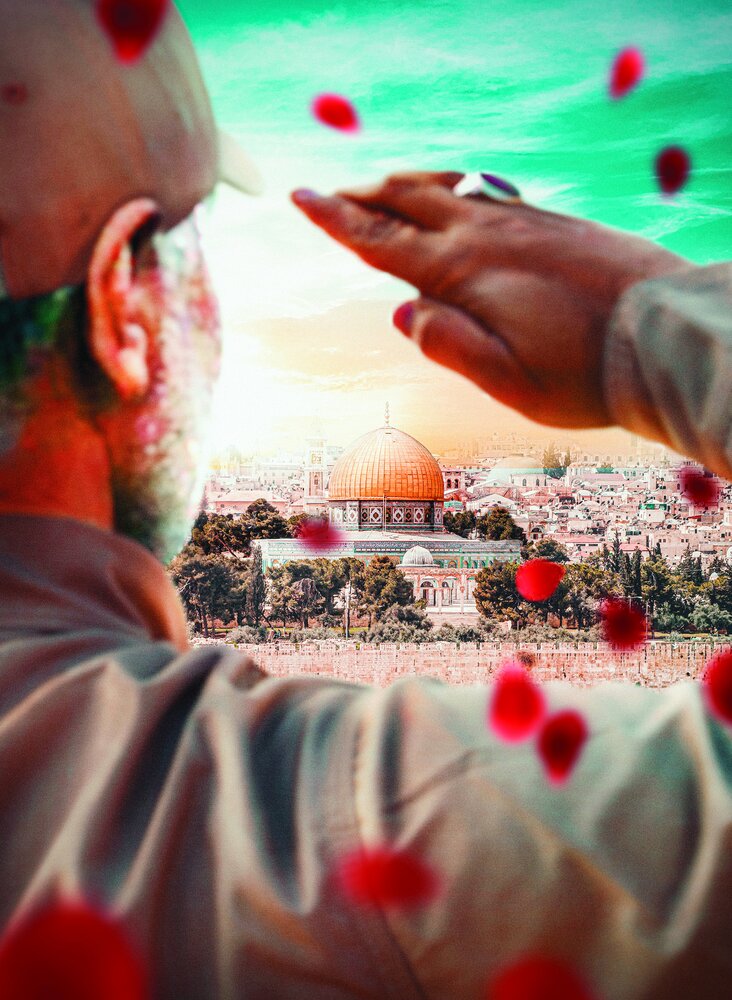Marching Through the Morning

TEHRAN – This year’s January 3 marks the second martyrdom anniversary of General Qassem Soleimani, the legendary commander of the IRGC’s Quds Force whose assassination by the Trump administration helped mobilize grassroots movements against U.S. military presence in the West Asia region.
Two years ago today the world woke up to the news that Iran’s most popular general has been assassinated in an American drone strike ordered by then-President Donald Trump. The strike took place near Baghdad Airport in the early hours of January 3, 2020. That night, General Soleimani had just arrived at the airport from a trip to neighboring Syria. He was received by his longtime friend Abu Mahdi al-Muhandis, the deputy chief of Iraq’s Popular Mobilization Forces (PMF), which played a pivotal role in trouncing the Daesh terrorist group.
After brief greetings, the two men left the airport in their motorcade heading to the Iraqi capital for meetings as usual. When they moved out of the airport an American hovering in the vicinity of them fired a number of missiles that targeted General Soleimani and al-Muhandis as well as their companions.
Millions of Iranians and Muslims around the world were shocked to hear the martyrdom of a general they loved for his bravery against terrorist groups in the region, especially Daesh, which posed a great danger to global security.
An outpouring of grief combined with anger started to appear on social media platforms such as Instagram. Millions of users expressed their love for the slain commander by posting photos and videos commemorating the general. But Instagram, along with other social media companies, embarked, most likely at the direction of the U.S. government, on a crackdown against the commander, banning any kind of posts related to General Soleimani.
Leader of the Islamic Revolution of Iran Ayatollah Seyed Ali Khamenei has pointed to this fact by saying that the arrogant powers’ efforts to eliminate any mention of Martyr Soleimani from the internet shows their fear of even the name of that martyr and their fear of this valuable role model being promoted and imitated. He went on to say, “In today’s world, the internet is in the hands of the arrogant powers. This reality should cause the officials in charge of the internet inside the country to be aware so that they may do something to prevent the enemy from doing whatever he wants in the internet wherever he wants.”
Many believe the crackdown was emblematic of the U.S. fear from the fallout from the martyrdom of Iran’s most popular general. But the crackdown failed to prevent Iranians from taking part in huge numbers in the funeral of the general. This further reinforced the belief that General Soleimani’s martyrdom would result in dire consequences for the U.S.
Ayatollah Khamenei pointed to this issue in his Saturday meeting with the family of the general and the officials in charge of the general’s commemoration conference.
Referring to the presence of tens of millions of people in General Soleimani’s burial ceremony, the Leader stated, “This reality shows that Haj Qassem was and still is the most popular person in the nation. Furthermore, the increasing influence his name and memory have in the world of Islam prove that dear Soleimani was and still is the most popular personality throughout the world of Islam.”
“Today in our region, Soleimani is a symbol of hope, self-confidence and bravery and a manifestation of resistance and victory. As some people have correctly pointed out, ‘Martyr’ Soleimani is more dangerous than ‘General’ Soleimani for his enemies,” the Leader said.
The martyrdom of General Soleimani set in motion a grassroots movement that aims to expel the U.S. troops from the region. Ayatollah Khamenei said thanks to the blessings from General Soleimani’s blood the U.S. has fled from Afghanistan and is facing growing troubles elsewhere in Iraq and Syria.
Two years after the assassination of General Soleimani the Resistance movement in the region works at full force to expel the U.S. troops from the region. Many U.S. analysts imagined that with the martyrdom of General Soleimani the Resistance Axis will die away. But their assessment of the impact of the assassination of General Soleimani proved short-sighted.
“With that crime, the enemy was trying to extinguish the light of the Resistance. But the miracle that was brought about due to the blood of these glorious martyrs, caused the Resistance to advance and the enemy to be pushed back in all fronts of confrontation,” General Hossein Salami, the Commander-in-Chief of the Islamic Revolutionary Guard Corps, said on Saturday.
